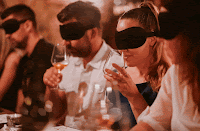One useful starting point is a brief web post by Shirley Mueller: Science and wine collecting: Do they mix? Scientists seem to have one opinion about the answer to this question, while high-end collectors have the other. Mueller is on the side of the scientists.
The three main points that she makes are:
- Among recent discoveries about wine appreciation is that vision is primary to our judgement of what we drink.
- We know that some people are gifted in their ability to appreciate wine; the rest of us can simply enjoy it.
- Even established authorities on wine are not necessarily able to distinguish wine properties in a blind tasting.
[A] When the [people being studied] were told the wine was expensive, the anterior part of their brain, the orbitofrontal cortex, was activated. This region is known to encode for pleasurable experiences during experiential tasks. On the other hand, there was no reaction in those [people being studied] who were informed that they were drinking cheap wine. This experiment suggests that what we believe about the wine we are drinking strongly influences how much we enjoy it.
[B] Not only is what we are told about the wine we are drinking important, but its presentation makes a difference in our perception of it. For example, the shape of the bottle and particulars of the label, plus the glass from which we drink the wine, affect us. Moreover, the music playing in the background can influence our experience of the wine, and the ambient light, which impacts the inherent color of the wine. This added information is a lot to take in.
[C] Charles Spence, a primary author in this area, has reviewed a number of papers regarding the skill of wine experts during wine tastings. He concludes that authorities on wine could not distinguish wine properties in a blind tasting, much less amateurs. Rather, the difference that was observed between novices and experts was that the latter were able to give identifications and classifications to wine aromas readily. This makes them appear smart, but in reality, their nose was no better than the neophytes. They could not distinguish one wine from another any better than the next person. In summary, [Spence] wrote: “Studies of perceptual learning in the world of wine suggest that the majority of the learning tends to be more conceptual / cognitive than specifically in terms of changes to sensory thresholds. In part, the reason for this may once again relate to the complexity of the underlying stimulus.”
I also directly addressed the work of Charles Spence in my previous blog post on this topic. Here, I will continue with some further pertinent quotes from him about tasting wine:
What has taken many people by surprise is just how easy it is to fool even the wine experts simply by deliberately miscolouring a wine. [Furthermore,] given the many well-controlled failures to discriminate wines blind on the basis of their age, quality, or price, the question then becomes one of what exactly the wine expert learns when training.
One [might] wonder how much of what goes on in, and is written about, the world of wine is some kind of social construction based on expectations rather than necessarily reflecting a genuine perceptual effect. The results of blind tastings, together with the extensive literature on the absence of sensory threshold changes in expert wine-tasters, certainly do suggest that higher-level cognitive / conceptual constructs, together with the associated mental imagery concerning what one is expected to taste / experience, play a major part in the wine-tasting experience, especially for the experts (and here, I am thinking particularly about the wine writers).
However, what becomes clear from the case of wine-tasting is the sequential nature of the taster’s multisensory interaction with the product. First come the visual cues, then orthonasal olfaction, and thereafter gustation, oral-somatosensation, and eventually retronasal olfaction. As such, the earlier presented cues (e.g. vision) tend to set expectations, and perhaps even generate mental imagery concerning the tastes and flavours that are expected to be present in the wine. These sensory expectations then anchor, guide, and possibly interact with the subsequent sensory inputs in ways that are yet to be fully elucidated.
Fiona Becket has also offered ideas concerning: Why wine tasting is an imperfect science. In particular, she has listed other factors that might affect the way in which you taste any particular wine:
- How long the wine has been opened and whether it’s been decanted
- How much is left in the bottle
- How many wines you’ve tasted beforehand
- What type of wine preceded the one you’re tasting
- Whether it’s a tank sample or a finished wine
- How familiar with or sympathetic you are to that particular style of wine
- How long since you’ve eaten and how much
- How well — or badly — you’ve slept
- Whether you’re jet-lagged and tasting in a different time zone
- What temperature the room is and whether it’s air-conditioned
- Whether there are extraneous smells
- The weather
- The psychological state of the taster




As a winemaker, I can say this is an excellent article, especially regarding the power of suggestion to sway our impressions of the wine.
ReplyDelete